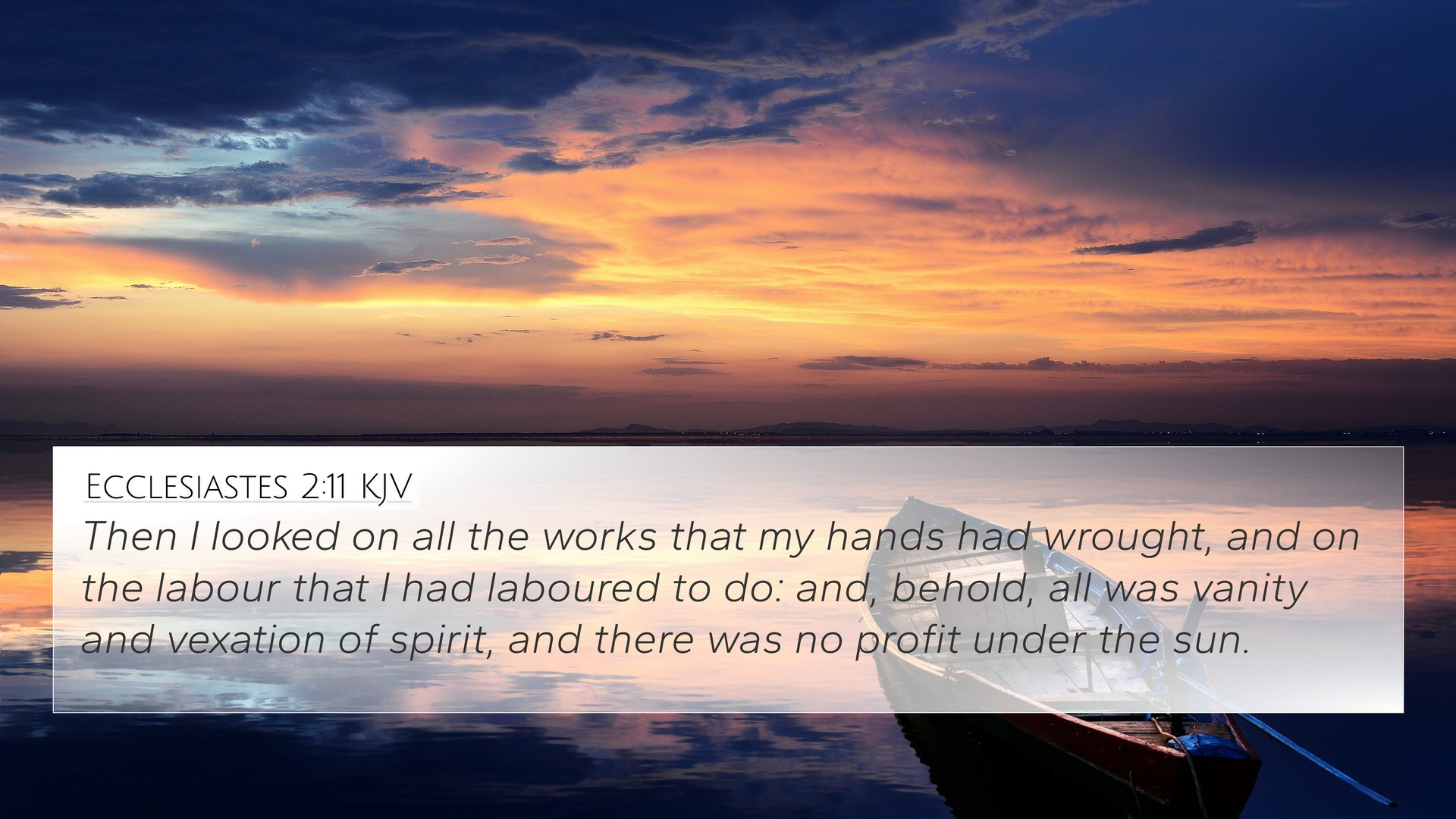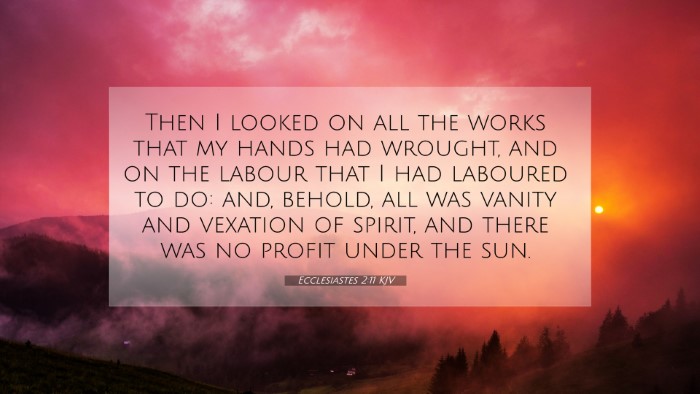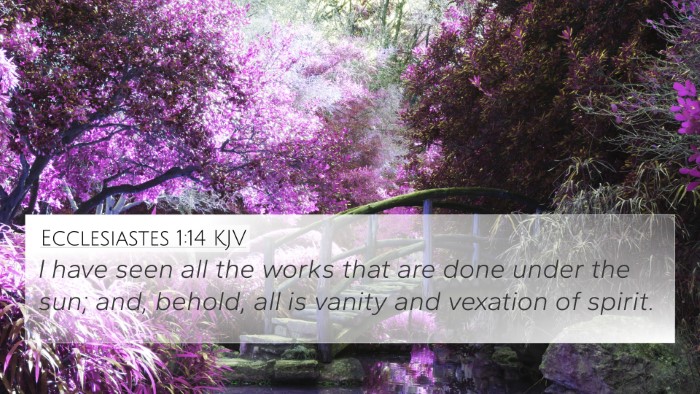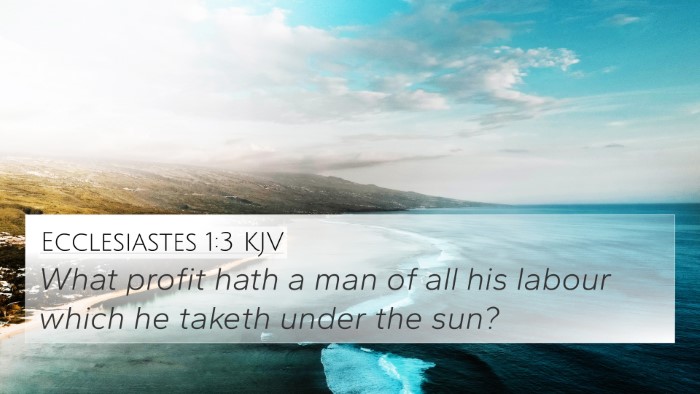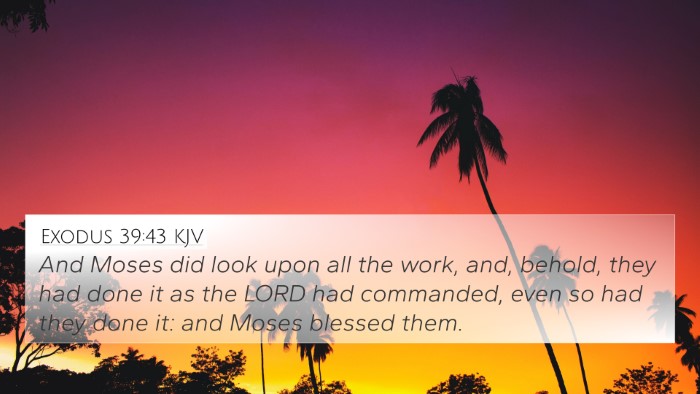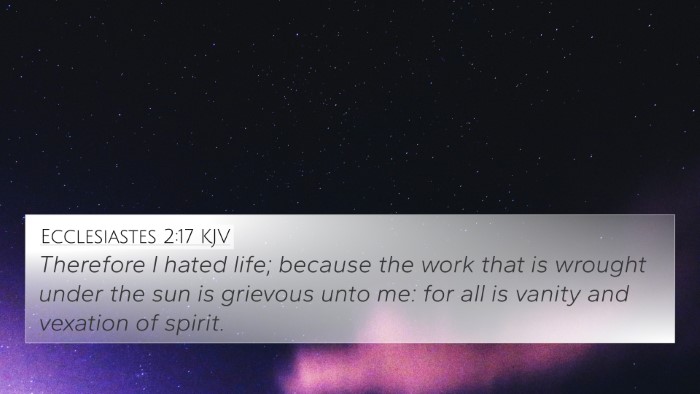Understanding Ecclesiastes 2:11
Ecclesiastes 2:11: "Then I looked on all the works that my hands had done, and on the labor in which I had toiled; and indeed all was vanity and grasping for the wind. There was no profit under the sun."
Overview
The book of Ecclesiastes is often considered a reflection on the meaning of life, exploring the futility of human endeavors apart from God. In Ecclesiastes 2:11, the author reflects on the results of his labor. The verse conveys a profound observation about the nature of pursuit and fulfillment.
Summary of Insights from Public Domain Commentaries
- Matthew Henry:
Henry elaborates on the concept of vanities as fleeting and unsatisfactory. He notes that the labor and achievements of life, when evaluated apart from the divine purpose, lead to a realization of emptiness. This verse encapsulates the human condition of striving without spiritual fulfillment.
- Albert Barnes:
Barnes discusses the philosophical interpretation of labor in light of mortality and the brevity of life. He posits that earthly toil, without reference to eternal values, results in disappointment. The verse highlights the vanity of undertaking efforts solely for personal gain.
- Adam Clarke:
Clarke provides context around the author's introspection. He asserts that human labor can appear futile when viewed in isolation from the purpose God has for each person. Clarke emphasizes the danger of excessive focus on our endeavors, which can distract from the eternal significance of our lives.
Thematic Connections
Ecclesiastes 2:11 can be linked to several Bible verses that discuss themes of vanity, purpose, and the nature of work. Here are some relevant cross-references:
- Psalm 127:1: "Unless the LORD builds the house, the builders labor in vain." This verse parallels the theme of God’s central involvement in human endeavors.
- Isaiah 40:6-8: "All flesh is grass, and all its loveliness is like the flower of the field..." This highlights the transient nature of human efforts.
- James 4:14: "For what is your life? It is even a vapor that appears for a little time and then vanishes away." Echoing Ecclesiastes, this emphasizes the brevity of life.
- 1 Corinthians 15:58: "Therefore, my beloved brethren, be steadfast, immovable, always abounding in the work of the Lord..." This contrasts with the futility suggested in Ecclesiastes.
- Philippians 3:19: "Whose end is destruction, whose god is their belly, and whose glory is in their shame..." A reminder that earthly pursuits lead to loss.
- Proverbs 10:22: "The blessing of the LORD makes one rich, and He adds no sorrow with it." This points to the divine aspect of true fulfillment in labor.
- Matthew 6:19-20: "Do not lay up for yourselves treasures on earth...but lay up for yourselves treasures in heaven..." This supports the notion of eternal value versus temporary gain.
Inter-Biblical Insights
This verse encourages the exploration of connections between Ecclesiastes and other biblical texts. For example, the futility described can be examined through the lens of both the Prophets’ warnings against misplaced trust in wealth and the New Testament teachings on spiritual priorities. Methodologies for cross-referencing can provide deeper understanding:
- Utilizing a Bible concordance to identify thematic similarities between books.
- Employing a cross-reference Bible study to draw parallels across different scriptures.
- Exploring Bible reference resources that facilitate deeper theological study.
- Engaging with Bible chain references to find related scriptures.
- Applying cross-referencing methods by examining the same themes in historical context.
Conclusion
Ecclesiastes 2:11 serves as a poignant reminder that without God, human labor is ultimately in vain. It invites readers to evaluate their own pursuits in light of eternal significance, challenging the notion of success based solely on earthly achievements. By studying this verse alongside related scriptures, believers are empowered to seek a deeper understanding of their purpose and the true meaning behind their hard work.
